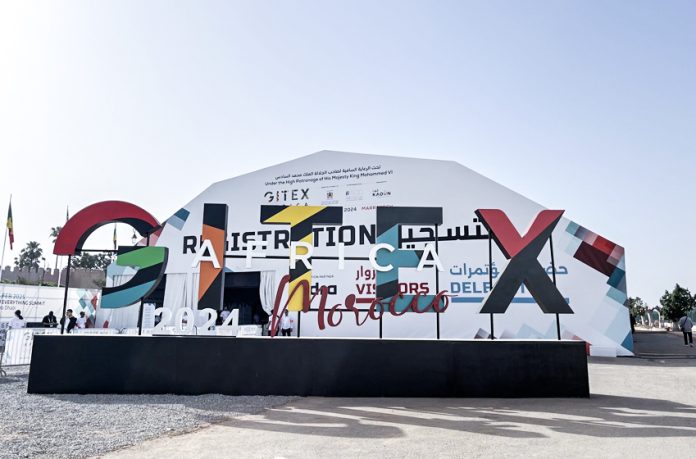The highly anticipated GITEX AFRICA Morocco 2024, the continent’s premier event for technology and start-ups, kicked off on Wednesday, May 29. The event, which spans three intensive days, focuses on digital opportunities and economic growth in Africa, bringing together influential tech experts, pioneering innovators, policymakers, government leaders, and investors.
Held under the patronage of His Majesty King Mohammed VI and organized in partnership with the Ministry of Digital Transition and Administrative Reform and the Digital Development Agency (ADD), GITEX AFRICA Morocco is coordinated by KAOUN International, the international arm of the Dubai World Trade Centre and the organizer of GITEX, the world’s largest technology event brand.
Aziz Akhannouch, Prime Minister of Morocco, inaugurated the event which runs until May 31. The event hosts over 1,400 tech companies and start-ups, more than 350 leading investors, over 600 speakers, and 100 government entities, drawing tens of thousands of participants from over 130 countries.
During the opening ceremony, Akhannouch shared the stage with dignitaries and ministers from Africa and beyond, including Ghita Mezzour, Morocco’s Minister of Digital Transition and Administrative Reform; Hamad Obaid Al Mansoori, Director General of Dubai Digital Authority; Chakib Alj, President of the General Confederation of Moroccan Enterprises (CGEM); Sidi Mohammed Drissi Melyani, Director General of Morocco’s Digital Development Agency; Lacina Koné, CEO of Smart Africa; and Trixie LohMirmand, CEO of KAOUN International.
In his speech, the Prime Minister emphasized the crucial role of technology and innovation in fostering significant alliances for Africa’s future: “Digital transformation is not just a ‘technological luxury’ but an essential driver for enhancing cooperation between African countries. It provides concrete solutions to the continent’s challenges, stimulates sustainable development, and creates an environment conducive to deeper integration among African nations.”
He continued, “Adopting and promoting this transformation is of paramount importance to realize Africa’s full potential in the 21st century. In this regard, the GITEX AFRICA exhibition serves as a privileged platform to discuss the key catalysts enabling the African continent to position itself as both a consumer and producer of digital technologies.”
Echoing this sentiment, Hamad Obaid Al Mansoori highlighted the shared digital vision between Morocco and the UAE: “Morocco and the UAE have embraced the path of digital revolution, making choices based on human interest within sustainable development. Reflecting on Dubai’s digital transformation since the turn of the millennium, we admire Morocco’s efforts in strengthening regional and international cooperation and building bridges over narrow borders.”
He added, “Today’s world is a small village, and the battle for sustainable development is our collective struggle. Individual achievements, no matter how successful, remain incomplete if not shared globally, as we are more interconnected than ever before.”
Ghita Mezzour celebrated the exceptional growth of start-ups in Morocco and Africa, many of which are represented at GITEX AFRICA Morocco 2024: “Over the past year, numerous start-ups have emerged in Morocco and Africa, and I am proud to see so many of them here today. This is not surprising given the rapid advancements in technology over the past year.”
She also emphasized the transformative potential of AI technology in Africa’s economy: “Imagine what our economies and lives will look like in the coming years. Supporting Africa’s growth as a technological and AI powerhouse is crucial for the continent’s industrialization and economic growth, and for creating jobs in a continent whose population will double by 2050, with 50% of Africans being under 25 by then.”
Sidi Mohammed Drissi Melyani underscored the vital role of both public and private sectors in accelerating digital transformation: “Hosting the second edition of GITEX AFRICA Morocco is a valuable opportunity to recognize the significant efforts of all digital development stakeholders, whether public administrations, agencies, or private companies. This technological revolution, actively participated in by all ecosystems with their various specialties, highlights our country’s emphasis on integrating technology and digitalization of services.”





